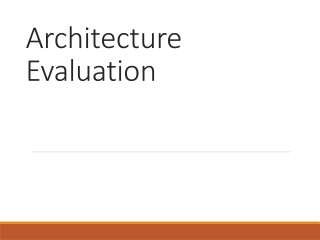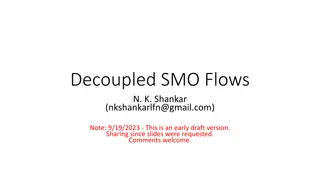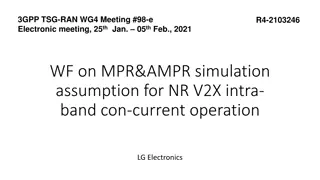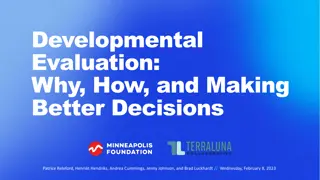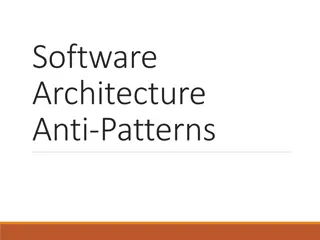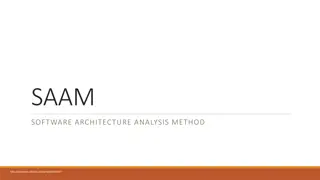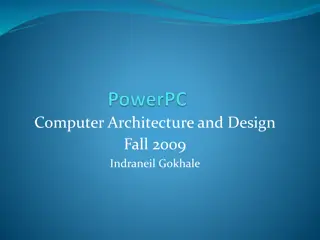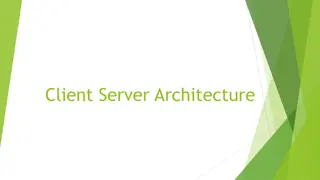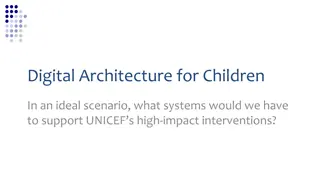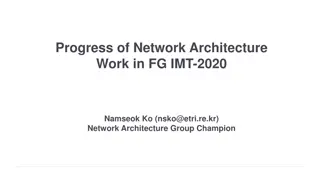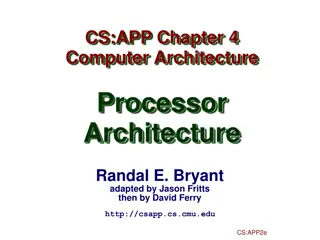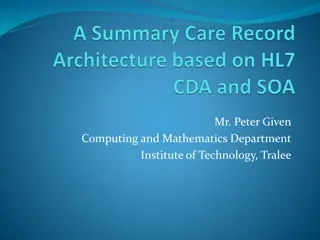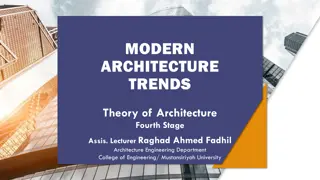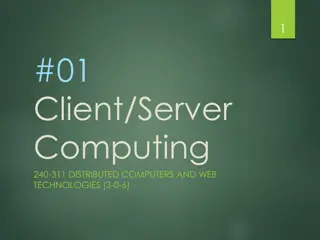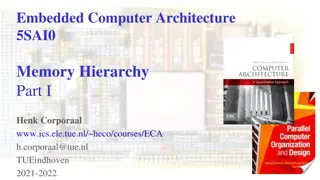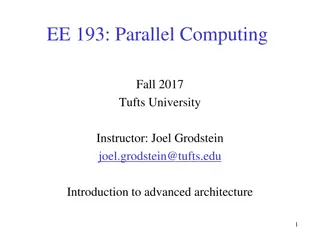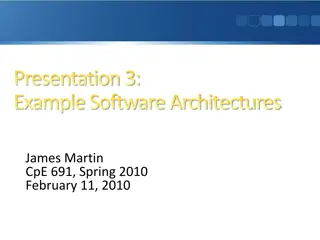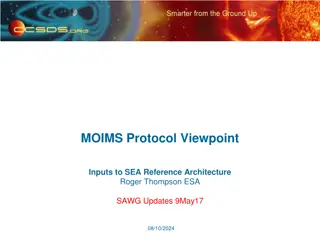Architecture Evaluation
Exploring various aspects of software architecture evaluation, including tradeoff analysis methods, factors affecting architecture quality, and the importance of evaluating design decisions early in the software development life cycle to avoid costly changes later on.
3 views • 26 slides
Computer Organization and Architecture
A computer system is a programmable digital electronics device that processes data as per program instructions to provide meaningful output. It comprises hardware and software components, with hardware being the physical parts and software essential for driving the hardware. Computer organization fo
15 views • 71 slides
Actions Emanating from the Evaluation of the Governance Reform
The evaluation of the governance reform within the WMO aimed to assess its alignment with strategic objectives, effectiveness in responding to societal needs, coordination efficiency, decision-making process, agility, and more. Evaluation criteria included relevance, design validity, effectiveness,
2 views • 13 slides
Decoupled SMO Architecture Overview
Develop flows showing interaction between SMO modules in the context of open-source architecture using OSC, ONAP, and other code. The objective is to align open-source work with O-RAN trends, improve synergy, reduce duplication, and provide feedback to O-RAN discussions. Related work includes Decoup
6 views • 27 slides
Comprehensive School Quality Assurance and Evaluation Process
A detailed insight into the Quality Assurance Department's role in school evaluation and improvement processes, including Whole School Evaluation (WSE), Follow-through initiatives, Teaching and Learning assessments, Resumption and Examination Monitoring. The process involves both internal self-evalu
1 views • 20 slides
Methods of Training Evaluation: Overview and Importance
Training and development are fast-growing fields globally, including in India. Evaluation plays a crucial role in understanding the effectiveness and efficiency of training programs for human resource development. This presentation covers the concept of training, evaluation strategies, methods/model
0 views • 61 slides
Universal Evaluation Framework: Simplifying Evaluation Processes
This session introduces the Universal Evaluation Framework (UEF) developed for evaluating QAA Scotland Enhancement Themes. Participants learn key evaluation questions, evidence capture, and the Theory of Change to enhance evaluation confidence. The QAA Scotland Evaluation Odyssey details historical
4 views • 14 slides
Implementing Blind Evaluation Pilot in HORIZON EUROPE: Key Facts and Process
HORIZON EUROPE is conducting a pilot on Blind Evaluation in the 2023-2024 work program to address biases in the research and innovation evaluation process. The pilot aims to assess the feasibility of blind evaluations in ensuring fairness and mitigating potential biases towards well-known organizati
9 views • 9 slides
Strengthening National Evaluation Capacity in the Era of Sustainable Development Goals
The presentation by Vijayalakshmi Vadivelu at the National Evaluation Capacities Conference 2017 in Istanbul focused on the importance of strengthening national evaluation capacity in alignment with the Sustainable Development Goals (SDGs). The content covers the holistic approach to national evalua
3 views • 18 slides
Overview of RF Architecture and Waveform Assumptions for NR V2X Intra-Band Operation
In the electronic meeting of 3GPP TSG-RAN-WG4, discussions were held on the RF architecture and waveform assumptions for NR V2X intra-band operation in band n79. Various options and recommendations were presented regarding RF architecture, antenna architecture, and waveform definitions for efficient
1 views • 7 slides
Developmental Evaluation for Better Decision-Making
Delve into the realm of developmental evaluation, focusing on its purpose, principles, and application in practice. Understand how developmental evaluation emphasizes real-time data collection for informed decision-making in complex systems. Learn about key principles such as developmental purpose,
1 views • 25 slides
Evaluation Practices in Macedonia: What Works, What Doesn't
The comparison between the effectiveness of evaluation practices and the presence of formal institutions in Macedonia raises questions about the impact of institutional design on outcomes. While some countries with robust evaluation institutions fall short in practice, others lacking such structures
1 views • 7 slides
Computer Architecture and Organization
Computer architecture and organization are fundamental aspects of computing systems. Computer architecture focuses on the functional design and implementation of various computer parts, while computer organization deals with how operational attributes come together to realize the architectural speci
3 views • 40 slides
Common Software Architecture Anti-Patterns
Anti-patterns in software architecture are commonly occurring solutions to problems that lead to negative consequences. These arise due to insufficient knowledge or experience, misuse of design patterns, and lack of attention to evolving project architecture. Examples include Jumble, Stovepipe, Spag
2 views • 7 slides
Software Architecture Analysis Method (SAAM)
Software Architecture Analysis Method (SAAM) is a method used to assess how well an architecture meets its goals. It involves developing scenarios, classifying scenarios, performing evaluations, revealing scenario interactions, and overall evaluation. Scenarios help test quality attributes like modi
1 views • 12 slides
PowerPC Architecture Overview and Evolution
PowerPC is a RISC instruction set architecture developed by IBM in collaboration with Apple and Motorola in the early 1990s. It is based on IBM's POWER architecture, offering both 32-bit and 64-bit processors popular in embedded systems. The architecture emphasizes a reduced set of pipelined instruc
2 views • 13 slides
Enhancing Evaluation Capabilities in Mongolia for Agenda 2030
The Mongolian Evaluation Network in collaboration with UNDP is working to integrate the 2030 Agenda into national strategies and plans, establish institutional coordination mechanisms, align budgets, and enhance data monitoring systems. Key stakeholders including government agencies, NGOs, and inter
0 views • 9 slides
Client-Server Architecture
Client-server architecture is a computing model where a central server hosts and manages resources and services for client computers over a network. There are different types of clients and servers, each with unique characteristics and roles. This architecture offers various advantages and disadvant
3 views • 15 slides
Evaluation in Education
Evaluation in education is a comprehensive term that encompasses measurement, testing, and qualitative examination of student behavior. It involves both quantitative and qualitative descriptions, along with value judgments. Differentiating from mere measurement, evaluation provides a deeper analysis
0 views • 28 slides
Digital Architecture for Supporting UNICEF's High-Impact Interventions
In an ideal scenario, the digital architecture for children would encompass systems such as Enterprise Architecture, Functional Architecture, and Solution Architecture to support UNICEF's high-impact interventions. It would involve integrated platforms for Health Information Exchange, Supply Chain M
2 views • 19 slides
Sustainable Evaluation Systems Workshop Summary
Workshop on Sustainable Evaluation Systems by Stephen Porter at the NEC Conference focused on defining evaluation systems, addressing their failures, and emphasizing the importance of quality, use, and networks in achieving sustainability. Participants engaged in activities such as bingo card introd
0 views • 38 slides
Strategic Management: Strategy Review and Evaluation
This chapter delves into the critical process of strategy review, evaluation, and control in strategic management. It covers the nature of strategy evaluation, effective evaluation systems, contingency planning, auditing, using computers for evaluation, and guidelines for effective strategic managem
1 views • 42 slides
Progress of Network Architecture Work in FG IMT-2020
In the Network Architecture Group led by Namseok Ko, significant progress has been made in defining the IMT-2020 architecture. The work has involved gap analysis, draft recommendations, and setting framework and requirements. Phase 1 focused on identifying 19 architectural gaps, such as demands for
2 views • 11 slides
Impact and Evaluation Toolkit for Churches and Christian Charities
This toolkit aims to equip churches and Christian charities engaged in small-scale social action projects to think about impact, measure impact, choose data tools, reflect on evaluation data, and use it effectively. It covers principles of evaluation, setting objectives, selecting indicators, storyt
1 views • 34 slides
Overview of Monitoring and Evaluation in the GEF
The Evaluation in the GEF and Training Module focuses on promoting accountability and learning within the Global Environment Facility (GEF) through monitoring and evaluation activities. The GEF Independent Evaluation Office plays a crucial role in assessing results, effectiveness, and performance of
0 views • 25 slides
Developing an Evaluation Work Plan for Effective Program Assessment
This presentation by Amy D. Andrade from San Jose State University focuses on developing an Evaluation Work Plan to identify responsibilities and timelines. It covers topics such as Evaluation Coaching Support, Webinar Outlines, Logic Model, Inputs-Outputs-Outcomes, Two Approaches to Evaluation, Pro
0 views • 29 slides
Proposed Way Forward for Service-Oriented Architecture (SOA) in Space Missions
Proposed establishment of a Working Group by the CESG to develop a Service-Oriented Architecture (SOA) framework for space mission operations within the CCSDS. The focus includes identifying services, use cases, architecture definitions, and business cases to enhance CCSDS-wide interoperability and
0 views • 7 slides
Evaluation Synthesis in Changing Contexts: Enhancing Knowledge for Development Effectiveness
Evaluation synthesis is crucial for promoting learning, reflection, and decision-making in development work. This process involves bringing together diverse knowledge sources to generate strategic insights and facilitate wider use of evaluation findings. The Independent Office of Evaluation of IFAD
0 views • 20 slides
Introduction to Y86 Instruction Set Architecture
Y86 Instruction Set Architecture is a simplified pseudo-language based on x86 (IA-32) architecture. It involves implementing the Fetch-Decode-Execute cycle, where instructions are fetched from memory, decoded, and executed. The Y86 ISA offers a simpler set of instructions and formats compared to x86
0 views • 25 slides
Evaluation of FME Zero Emission Neighbourhoods in Smart Cities
The mid-term evaluation process of FME Zero Emission Neighbourhoods in Smart Cities involves self-evaluation, partner evaluation, and panel evaluation. The procedure includes scientific review, evaluation by scholars, and innovation assessment. Key documents like self-reports, progress reports, and
1 views • 20 slides
Enhancing Healthcare Data Sharing with Service-Oriented Architectures
This paper explores how Service-Oriented Architectures (SOA) can be integrated with the HL7 Clinical Document Architecture to facilitate the sharing of Summary Care Records between healthcare information systems. It highlights the benefits of a federated architecture based on SOA and coding standard
0 views • 51 slides
Overview of Regular Evaluation 2017 Findings in Estonia
In the Regular Evaluation 2017, efforts were made to maximize the benefits of evaluation outcomes for various stakeholders in Estonia such as the state, society, and institutions. The evaluation focused on a range of actions including preparing legislation, finding experts, creating self-report form
0 views • 6 slides
Modern Architecture Trends: Expressionism and Bauhaus Movement
Delve into the world of modern architecture trends, focusing on Expressionist architecture in Europe during the early 20th century and the influential Bauhaus movement in Germany. Expressionist architecture emphasized emotional effects through distorted forms inspired by nature, while the Bauhaus sc
0 views • 10 slides
Overview of 5G System Architecture and User Plane Functionality
This content showcases various aspects of 5G system architecture, including system handover, non-roaming architecture, service-based architecture, and user plane functionality. It delves into the control plane functions, user plane functions, and core network endpoints of the 5G network. The images
0 views • 49 slides
Comprehensive Guide to Training Evaluation Methods
This detailed guide covers the aim of evaluation, evaluation methods, techniques of evaluation, types of evaluation (formative, process, outcome, impact), and the significance of formative and process evaluation in assessing training effectiveness. Learn about the key principles and practices involv
1 views • 45 slides
Client/Server Computing Architecture
Client/Server Computing architecture separates clients and servers over a network, allowing for file sharing, resource allocation, and service requests. Clients initiate services from servers, with transparent server locations and message-passing transactions. Systems with C/S architecture include f
0 views • 18 slides
Memory Hierarchy and Different Computer Architecture Styles
Delve into the concepts of memory hierarchy, cache optimizations, RISC architecture, and other architecture styles in embedded computer architecture. Learn about Accumulator and Stack architectures, their characteristics, advantages, and example code implementations. Explore the differences between
2 views • 52 slides
Advanced Computer Architecture in Parallel Computing
Covering topics like Instruction-Set Architecture (ISA), 5-stage pipeline, and Pipelined instructions, this course delves into the intricacies of advanced computer architecture, with a focus on achieving high performance by optimizing data flow to execution units. The course provides insights into t
0 views • 12 slides
Software Architecture Design for Document Filter System: A Case Study
This presentation delves into the software architecture design and implementation of a Document Filter System (DFS) aimed at efficiently finding relevant information. It discusses the architecture's effectiveness in supporting diverse applications, multilingual document searching, complex query func
0 views • 33 slides
MOIMS Protocol Viewpoint for SEA Reference Architecture Updates
This content describes the MOIMS Protocol Viewpoint inputs to the SEA Reference Architecture updates by Roger Thompson from ESA SAWG. It includes details about the graphical conventions, data store elements, organizational domains, network layers, communications protocols, and space communications c
0 views • 21 slides
